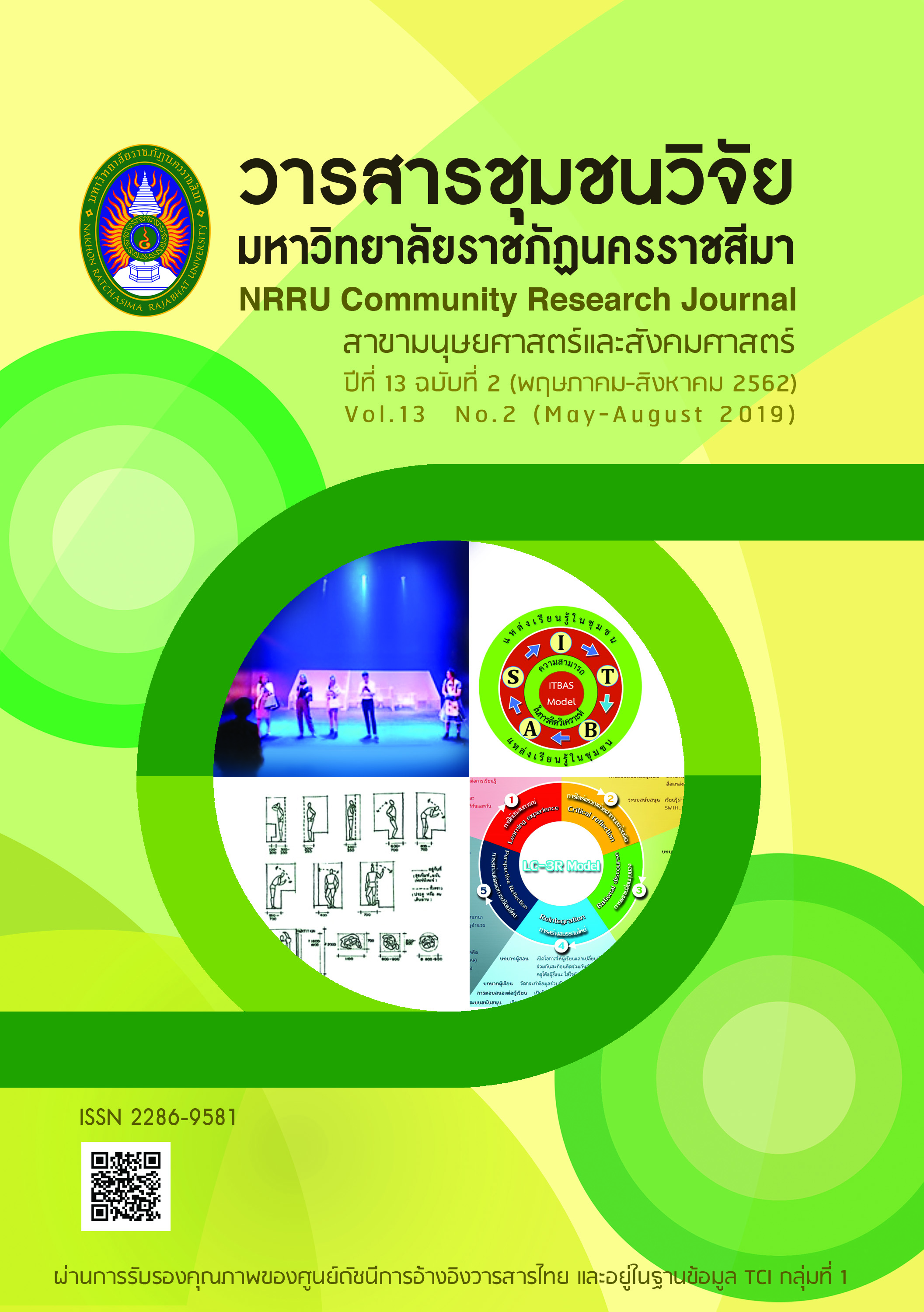นโยบายเงินทุนหมุนเวียนและความสามารถในการทำกำไร ของบริษัทกลุ่มสินค้าอุตสาหกรรมในประเทศไทย
DOI:
https://doi.org/10.14456/10.14456/nrru-rdi.2019.28คำสำคัญ:
เงินทุนหมุนเวียน, นโยบายเงินทุนหมุนเวียน, ความสามารถในการทำกำไร, สินค้าอุตสาหกรรมบทคัดย่อ
การจัดการเงินทุนหมุนเวียนมีบทบาทสำคัญในการกำหนดความสำเร็จหรือความล้มเหลวของกิจการเนื่องจากสามารถส่งผลกระทบต่อผลกำไรได้ ดังนั้นผู้บริหารทางการเงินควรพิจารณานโยบายเงินทุนหมุนเวียนที่เหมาะสมกับเพื่อที่จะสามารถเพิ่มผลกำไรให้กับกิจการต่อไป โดยการวิจัยนี้เป็นการศึกษาถึงผลกระทบของนโยบายเงินทุนหมุนเวียนที่มีผลต่อกำไรของกิจการในกลุ่มสินค้าอุตสาหกรรม โดยเก็บรวบรวมข้อมูลจากกลุ่มตัวอย่างจำนวนทั้งสิ้น 115 บริษัท ซึ่งบริษัทจดทะเบียนในตลาดหลักทรัพย์แห่งประเทศไทย 82 บริษัท และ บริษัทจดทะเบียนตลาดหลักทรัพย์ เอ็ม เอ ไอ 33 บริษัท เก็บข้อมูลระหว่างปี 2556-2560 และทำการวิเคราะห์ข้อมูลด้วยสถิติเชิงอนุมานโดยการวิเคราะห์การถดถอย เพื่อดูผลกระทบของนโยบายเงินทุนหมุนเวียนที่ส่งผลต่อกำไร
ตัวแปรอิสระในการวิจัยนี้คือนโยบายเงินทุนหมุนเวียน ซึ่งประกอบด้วย นโยบายการลงทุนในเงินทุนหมุนเวียนและนโยบายการจัดหาเงินทุนหมุนเวียนทางการเงิน โดยนโยบายการลงทุนในเงินทุนหมุนเวียนวัดจากสินทรัพย์หมุนเวียนต่อสินทรัพย์รวม และนโยบายทางการจัดหาเงินทุนหมุนเวียนวัดจากหนี้สินหมุนเวียนต่อสินทรัพย์รวม และใช้อัตราผลตอบแทนต่อสินทรัพย์เป็นตัวแทนของผลกำไร ผลการวิจัยพบว่านโยบายการลงทุนในเงินทุนหมุนเวียนมีความสัมพันธ์เชิงบวกอย่างมีนัยสำคัญกับผลกำไร แต่นโยบายการจัดหาเงินทุนหมุนเวียนมีผลกระทบเชิงลบอย่างมีนัยสำคัญกับการทำกำไรของกิจการ โดยสรุปอาจกล่าวได้ว่า กิจการที่ใช้นโยบายการลงทุนในเงินทุนหมุนเวียนและนโยบายการจัดหาเงินทุนหมุนเวียนอย่างระมัดระวังสามารถเพิ่มผลกำไรให้กับกิจการได้
References
Adam, A. M., Quansah, E., and Kawor, S. (2017). Working Capital Management Policy and Return of Listed Manufacturing Firms in Ghana. Scientific Annals of Economics and Business, 64(2), 255-269.
Business Stock News Online. (2015). Top 6: Stocks of Industrial products. Retrieved July, 2018 from https://www.kaohoon.com/content/78653
Filbeck, G. and Krueger,T.M. (2005). An Analysis of Working Capital Management Results Across Industries. Mid-American Journal of Business, 20(2), 10-17.
Foerster, S. (2005). Financial Management: Concepts and Applications. United Kingdom: Pearson Education Limited.
Garcia-Teruel, P.J. and Martinez-Solano, P. (2007). Effects of working capital management on SME profitability. International Journal of Managerial Finance, 3, 164-177.
Hassani, M. and Tavosi, A. R. (2014). To survey the effect of working capital policies (investing & financing) on profitability risk (evidence from Tehran stock exchange). Journal of Investment and Management, 3(1), 30-36.
Kesimli, I. G., and Gunay, S. G. (2011). The Impact of the Global Economic Crisis on Working Capital of Real Sector in Turkey. Business and Economic Horizons, 4(1), 52-69.
M Report. (2018). The Export of Thai Industrial products in July 2018. Retrieved July, 2018, from https://www.mreport.co.th/news/economy/093-Thailand-Industrial-Export- July-2018
Mwangi, L. W., Makau, M. S., and Kosimbei, G. (2014b). Effects of Working Capital Management on Performance of Non-Financial Companies Listed In NSE, Kenya. European Journal of Business and Management, 6(11), 195-205.
Nazir, M. S., and Afza, T. (2009). Working Capital Requirements and the Determining Factors in Pakistan. IUP Journal of Applied Finance, 15(4), 28-38.
Raheman, A., Afza, T., Qayyum, A., and Bodla, M. A. (2010). Working Capital Management and Corporate Performance of Manufacturing Sector in Pakistan. International Research Journal of Finance and Economics, 47, 157-169.
Sabri, T.B. (2012). The impact of working capital on the value of the company in light of differing size, growth, and debt. Peer-reviewed and Open access journal, 7(1), 27-41.
Siddiquee, M. and S.M. Khan, 2009. Analyzing Working Capital Performance: Evidence from Dhaka Stock Exchange (DSE) Ltd. (April 7, 2009). Available at SSRN: https://ssrn.com/abstract=1374210
Shubiri, F. N. (2011). Determinants of Changes Dividend Behavior Policy: Evidence from the Amman Stock Exchange. Far East Journal of Psychology and Business, 4(2), 1-15.
The Stock Exchange of Thailand. (2018). Industry Grouping and Business Sector. Retrieved July, 2018, from
https://www.set.or.th/TH/regulation/simplified_regulations / industry_sector_p1.html
The Stock Exchange of Thailand. (2018). Securities Registration. Retrieved July, 2018, from
https://www.set.or.th/th/faqs/listing_p1.html



